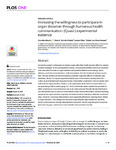Increasing the willingness to participate in organ donation through humorous health communication: (Quasi-) experimental evidence
Betsch, Cornelia
Schmid-Küpke, Nora K.
Otten, Leonie
von Hirschhausen, Eckart
Increasing people’s willingness to donate organs after their death requires effective communication strategies. In two preregistered studies, we assessed whether humorous entertainment education formats on organ donation elicit positive effects on knowledge, fears, attitudes, and behavioral intentions–both immediately after the treatment and four weeks later. We test whether perceived funniness mediates expected effects on attitudes and intentions. Study 1 is a quasi-experiment which uses a live medical comedy show (N = 3,964) as an entertainment education format, which either contained or did not contain information about organ donation. Study 2, a lab experiment, tests humor’s causal effect in a pre-post design with a control group (N = 144) in which the same content was provided in either a humorous or non-humorous way in an audio podcast. Results showed that humorous interventions per se were not more effective than neutral information, but that informing people about organ donation in general increased donation intentions, attitudes, and knowledge. However, humorous interventions were especially effective in reducing fears related to organ donation. The findings are discussed regarding the opportunities for sensitive health communication through entertainment education formats, psychological processes that humor triggers, and humor’s role in health communication formats.

